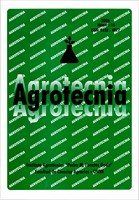Efectos de la inoculación con aislamientos de rizobios y su interacción con el basalto sobre el crecimiento de Medicago polymorpha L.
DOI:
https://doi.org/10.30972/agr.0336894Palabras clave:
Trébol de carretilla, acidificación, polvo de roca basálticaResumen
El objetivo del trabajo fue evaluar el efecto de la inoculación de tres aislamientos de rizobios del cepario de la cátedra de Microbiología-UNNE, con y sin el agregado de basalto, sobre el crecimiento de Medicago polymorpha. El ensayo tuvo un diseño factorial 3 x 2, con 6 tratamientos y 5 repeticiones, bajo invernáculo: T1: A52 sin basalto; T2: A52 con basalto; T3: A194 sin basalto; T4: A194 con basalto; T:5 A140 sin basalto; T6: A140 con basalto. Los datos tomados fueron analizados mediante ANOVA, con prueba de Fisher (p<0,05) para la comprobación de medias. Se pudo observar que los tratamientos T6 y T4 fueron superiores al T2 en un 37% y 22% respectivamente para la variable número de hojas por planta. El T4 presentó el mayor número de ramificaciones por planta seguido del T6, diferenciándose de T2 en un 53% y 42% respectivamente. Estas diferencias posiblemente se deban a la capacidad de estos microrganismos de promover el crecimiento vegetal mediante el mecanismo de solubilización del polvo de roca que genera mayor disponibilidad de nutrientes. El A52 se comportó de manera opuesta, obteniendo mejores resultados en las variables mencionadas en el tratamiento sin basalto (T1). No hubo diferencias estadísticamente significativas entre tratamientos para las variables volumen radical, peso seco de raíz, vástago y producción total por planta. Sólo se observaron nódulos en una planta del T6. El resto de los tratamientos no presentaron nódulos, lo que podría atribuirse a la alta especificidad de M. polymorpha o al tipo de suelo utilizado en el ensayo.



